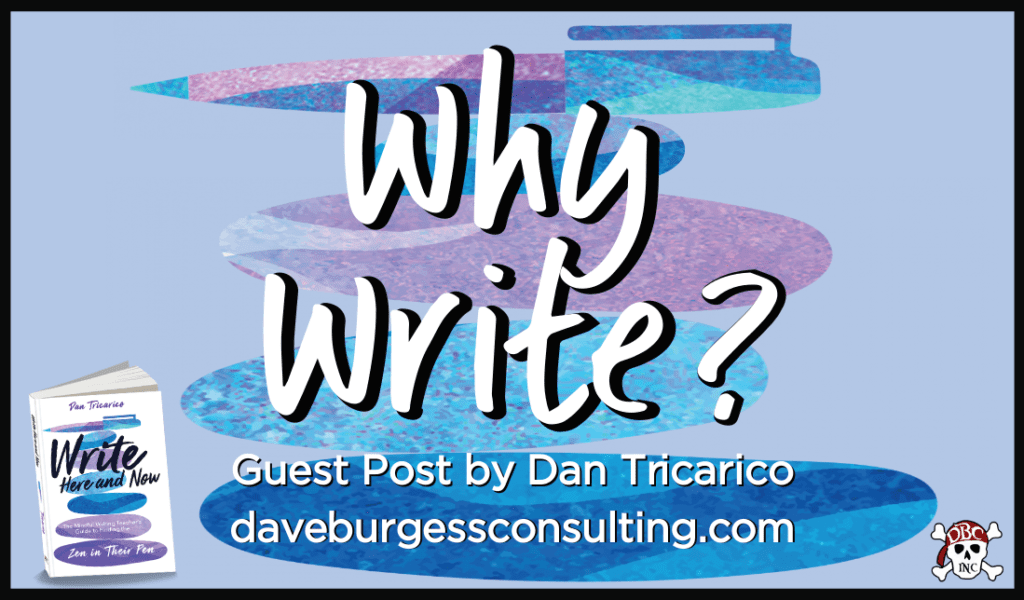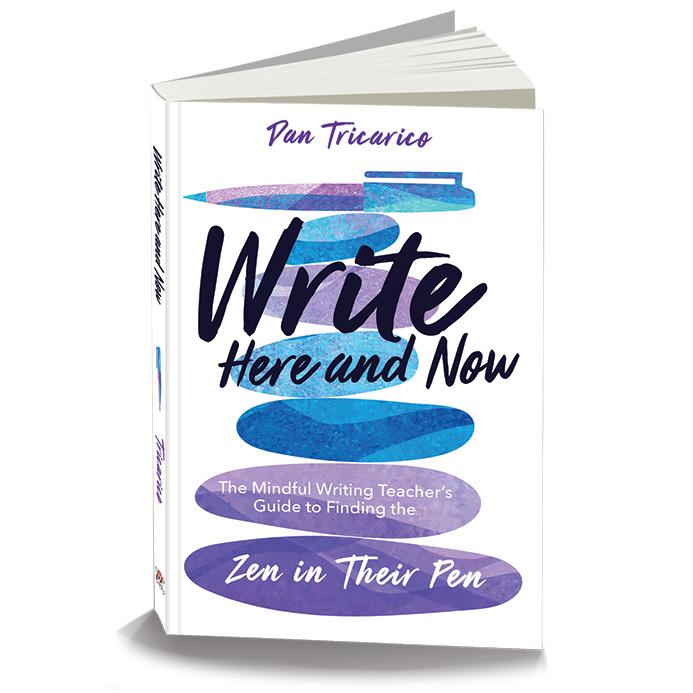Today's guest post is brought to you by a high school English teacher for over twenty-five years!
In his spare time, he enjoys writing fiction, listening to music (especially Roots Rock and The Blues), reading mystery novels, staring out of windows, and watching movies. One of his first loves is writing poetry, and he's published many poems both in print and online.
He's also the author of our brand new DBC, Inc. release Write Here and Now: The Mindful Writing Teacher's Guide to Finding the Zen in Their Pen, as well as, The Zen Teacher: Creating Focus, Simplicity, and Tranquility in the Classroom (DBC, Inc. 2015) and Sanctuaries: Self-Care Secrets for Stressed Out Teachers (DBC, Inc. 2018).
Please welcome...Dan Tricarico!
Take it away, friend!
Why Write?
You know those writers who say they’ve been writing ever since they could hold a pencil? That’s me. I’ve been writing for as long as I can remember, and if I go too long without doing it, I get cranky. I feel off. If more than a few days go by and I haven’t taken up a pen or keyboard to jot down some thoughts or write a poem or work on a chapter in a new book, a profound restlessness creeps in.
Compulsive writers are only slightly less irksome than those folks who overshare about their commitment to Crossfit or fill up their Instagrams with half-marathon circuits or blog ceaselessly about the benefits of veganism. Much like the weightlifting, running, and tofu crowd, writers feel that pushing nouns against verbs makes us special and unique in some way.
But there’s a reason we feel that way: We know a secret. We know that writing is a beautiful opportunity to explore how we feel and what we think. It’s a chance to crystalize our thoughts and ideas so that we know how to move forward. It’s a way of making sense of, and giving order, to the world. Clearly and effectively expressing what we think and feel in words is one of the most important skills we possess. And that’s why, at least for me, writing is an obsession, a compulsion, an illness.
But now think about our public and private schools. We do not ask our students to write, nor do we even allow our students to write. The brutal truth is that we force our students to write. We tell them that it’s “good for them” as if it’s Castor oil for the mind or broccoli for the soul. Of course it is good for them, but let’s be honest, most of them don’t want to do it. And why would they? Tell the truth: When was the last time you wrote a multi-paragraph essay on A Midsummer’s Night’s Dream or an argumentative piece discussing whether or not the latest Malcolm Gladwell piece was sufficiently supported with effective evidence?
Did you jot down a poem about last night’s sunset?
Doubtful.
Did you do write a piece of flash fiction on your last summer break?
Hardly.
Did you crank out an episode review for your blog between bingeing episodes of Game of Thrones?
Definitely not.
You may be a teacher. Hell, you may even be an English teacher. But the odds are good that the last thing you wrote was probably that letter you stuff in your Christmas card saying that Evan just won the 5th grade Science Fair or that Jessica just got accepted to Pepperdine.
Of course, I kid.
I don’t kid about the content, that probably is the last thing you wrote. I kid that
it isn’t okay. A warm and friendly Christmas letter is a wonderful thing and a lovely way to share your life with loved ones, and so why not?
But if we know that having our students write is important, why don’t we do it more?
Why aren’t we modeling it?
A question for the ages.
Writing (and literacy in general) should most certainly be cross-curricular skill. In other
words, students should be writing in every single class they sit in. That may just be my prejudice, but I don’t think so. Research backs it up.
There are excellent writing teachers out there in the world who may be even more fabulous editors, but I can’t help but wonder how much better their students’ writing skills would be if those teachers came into the classroom and said, “Wow! I was struggling with this piece last night and I just couldn’t get it to work. But I’ve been there before, and I know I’ll figure it out. Just gotta keep writing.”
Writing takes time. It takes focus and concentration, two qualities that are in sad deficit in our current culture and in our current time, especially in the modern American classroom (standardized testing, anyone?).
So those folks who say they want to write something (everyone has a “book” inside them, after all, haven’t you heard?) say things like, “Oh, I’d love to write, but I just don’t have the time.” The truth is, I don’t either. Sometimes I get up woefully early. Sometimes I stay up late. Sometimes I write on my lunch period. I do what it takes. And it may also require sacrifice. I don’t watch as much television as the average person. I was sometimes a little too tired and grumpy with my family. I never work out. Okay, even if I never had the desire to write a single word, I’d probably never step foot in a gym, but you get my point. All of us have activities in our daily schedules, both critical and superfluous, necessary and indulgent, that we could—if we wanted to—streamline or eliminate in order to make time to write.
Ultimately, writing is a choice.
Knowing I had a desire to write, I adjusted a few small things in my schedule and
suddenly, I discovered thirty minutes, three times a week, and that’s how this book was written. If you asked me straight out, I would say that I don’t have time to write. But as I tell people, “Books don’t write themselves.” No one really has time to write. But I’ve written nine books with “no time to write,” five of which have been published. If you want to do something, you find a way.
For students, though, it’s not a matter of time. It’s often a matter of motivation or investment. They often think: Why write at all? What’s in it for me?
I can’t tell anybody why they should write, but I can tell you why I write.
I write:
To explore my feelings (journal, blog)
To figure out what I think (journal, blog)
To capture a moment (usually poetry)
To be in the moment (poetry)
To share my thoughts (blog)
To tell a story (fiction)
To brainstorm about my writing, life, and Zen Teacher stuff (my bullet journal)
Simply for fun (poetry, blog, fiction)
To try to make sense of the world (all of the above)
I also write because, as I said at the beginning of this chapter, it relaxes me. Along with actual therapy, it’s my therapy. Right this minute, for example, it’s 7:30 a.m., and I am sitting in my classroom, sipping hot coffee as I type, listening to Billie Holiday on the boombox as a soft rain falls outside my classroom windows. It’s absolute bliss. I am at peace and the world is right. As a bonus, I’m creating.
Even for this writer, though, it is hard to articulate in words how grateful I am that this nearly thirty writing minute session will be one of the perfect moments of my day. But it will be.
Almost always, writing helps me understand what’s going on.
It brings me a sense of inner peace and order.
And that’s always worth half an hour of my day.
- Dan
Learn even more from Dan's book Write Here and Now by clicking the link below to preview it for FREE.
Thank You, Dan!
Thanks, Dan!
We are so proud of all of your amazing work!
If you don't already, follow Dan on Twitter for more engaging content!
Also, you will want to check out his website thezenteacher.com and his brand new book, Write Here and Now: The Mindful Writing Teacher's Guide to Finding the Zen in Their Pen.
Write Here and Now
Make Every Encounter with Writing More Meaningful
More info →





